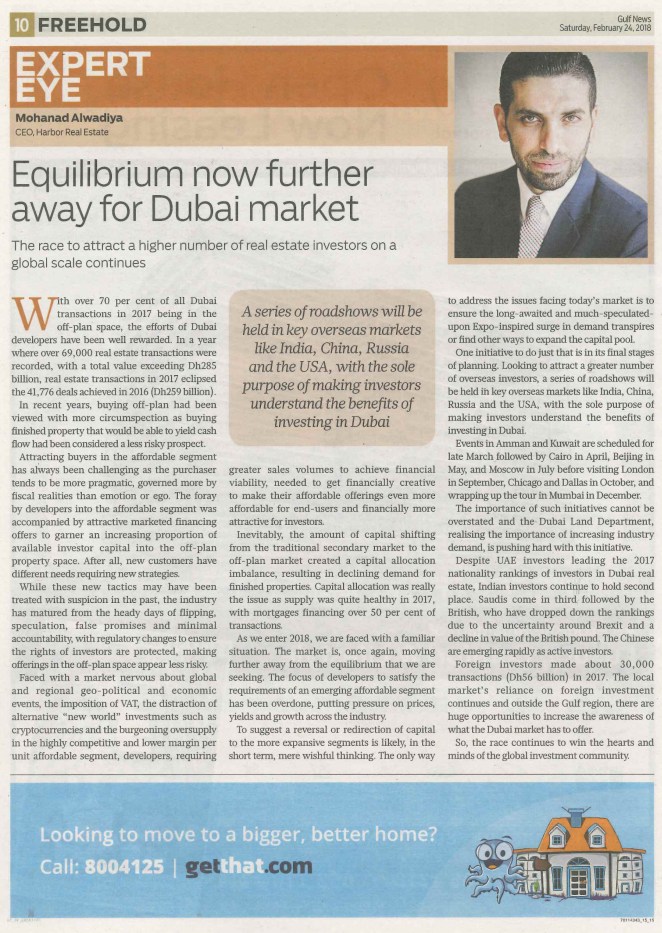STALLING WILL GET YOU NOWHERE ; INVEST TODAY
The opportunities currently available will certainly never come again
By Mohanad Alwadiya
CEO, Harbor Real Estate
Senior Advisor & Instructor, Dubai Real Estate Institute
Stalling will get you nowhere invest today“opportunity knocks only once” is an oft-quoted proverb in life, and it rings even truer when it comes to real estate. Others may argue that other opportunities will present themselves in the future; true, but will they be the exact-same opportunities?
It would, of course, be great if these future opportunities actually materialize; excellent, if they turn out to be better opportunities. But then, what if they don’t – which is usually the case as far as opportunity in real estate is concerned. After all, land is not unlimited and a building or unit, once sold, won’t likely change hands several times in the course when it is perceived to be at its peak value.
Expertise derived from hindsight has no place at the table of successful people, and regret is a fruitless and pointless emotion. Successful people thrive on opportunities, not lost opportunities. If they cannot make one opportunity work to their satisfaction, they move on and find another opportunity. Regret simply diverts energy and focus from the effective pursuit of the next great opportunity.
For those still currently on the fence about real estate investment, resolve to buy TODAY. After all, oil prices aren’t expected to go anywhere soon, the decline of the Russian ruble and the Euro versus the US dollar has effectively made offshore investing appear too expensive for many, there are reports of a growing oversupply and the inevitable interest rate increases on the US dollar, and its AED cousin, will only further hamper overseas investment and overall market liquidity.
While these considerations are valid and worthy harbingers of the dreaded procrastination, we need to put our positive hat on for a while, and consider the following…
Put simply, Dubai needs people to support an economy that is expected to grow at an estimated 5 percent percent-plus annually for the remainder of the decade and to deliver initiatives such as the 2020 World Expo. The Expo alone is expected to generate an additional 277,000 jobs and drive demand for housing and commercial facilities that, by and large, don’t currently exist. Much of the city’s planning comprehends the number of people living in the emirate to grow to 3.4million people by 2020, a 7 percent annual increase from today’s population of 2.25million.
While the price of oil is a big issue for the region’s economies, with oil representing only about 4 percent of Dubai’s GDP, the effect of the decline in oil prices is not as drastic as some may think. Dubai’s economy is being driven by fundamentals such as tourism and trade and a slew of new projects to grow these important revenue-generating economic segments. Dubai welcomed 4.1 million overnight visitors in the first three months of 2016, which represented a 5.1 percent increase over the same period last year continuing a growth trend of approximately 10 percent per annum since 2010.
But those visitor numbers will seem paltry once the 2020 Expo kicks off. And the 277,000 extra jobs that will be generated to ensure the estimated 20 million visitors of the Expo see Dubai in its most favorable light cannot be underrated in terms of generating significant demand for real estate assets.
And though the ongoing speculation surrounding the US Federal Reserve’s intention to raise interest rates is making many people nervous, we can be sure that interest rates in the US will eventually rise and the AED will continue to get stronger. To invest in a market that is undergoing a 10 percent to 20 percent correction in a currency that certain to appreciate only makes sense, especially when financing is still cheap and will remain so for quite some time.
While on the topic of certainty, there is no doubt that a stabilized real estate market will provide a much better launch pad for what will be a period of significant economic and commercial activity over the next 5 to 7 years. The structural shift towards more affordable housing will not only serve to accommodate the expected rapid population growth associated with the 2020 Expo, but also serve as an important factor in the development of the Dubai economy overall.
Still unconvinced or undecided?
Remember the opportunities that have come with 2015 and 2016 – the period of opportunity for the astute investor – will most certainly never come again. Ask around for expert advice, conduct your own research, make the calculations and decide now, today, so you won’t find yourself scratching your head in disappointment five years hence.










